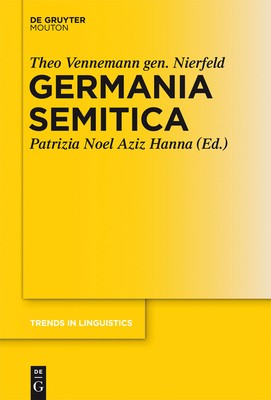
- We will send in 10–14 business days.
- Author: Theo Vennemann Gen Nierfeld
- Publisher: Walter de Gruyter
- Year: 2012
- Pages: 742
- ISBN-10: 311030094X
- ISBN-13: 9783110300949
- Format: 16.9 x 23.4 x 5.1 cm, hardcover
- Language: English
- SAVE -10% with code: EXTRA
Reviews
Description
Germania Semitica explores prehistoric language contact in general, and attempts to identify the languages involved in shaping Germanic in particular. The book deals with a topic outside the scope of other disciplines concerned with prehistory, such as archaeology and genetics, drawing its conclusions from the linguistic evidence alone, relying on language typology and areal probability. The data for reconstruction comes from Germanic syntax, phonology, etymology, religious loan names, and the writing system, more precisely from word order, syntactic constructions, word formation, irregularities in phonological form, lexical peculiarities, and the structure and rules of the Germanic runic alphabet. It is demonstrated that common descent is neither a necessary nor a sufficient condition for reconstruction. Instead, lexical and structural parallels between Germanic and Semitic languages are explored and interpreted in the framework of modern language contact theory.
EXTRA 10 % discount with code: EXTRA
The promotion ends in 9d.20:00:40
The discount code is valid when purchasing from 10 €. Discounts do not stack.
- Author: Theo Vennemann Gen Nierfeld
- Publisher: Walter de Gruyter
- Year: 2012
- Pages: 742
- ISBN-10: 311030094X
- ISBN-13: 9783110300949
- Format: 16.9 x 23.4 x 5.1 cm, hardcover
- Language: English English
Germania Semitica explores prehistoric language contact in general, and attempts to identify the languages involved in shaping Germanic in particular. The book deals with a topic outside the scope of other disciplines concerned with prehistory, such as archaeology and genetics, drawing its conclusions from the linguistic evidence alone, relying on language typology and areal probability. The data for reconstruction comes from Germanic syntax, phonology, etymology, religious loan names, and the writing system, more precisely from word order, syntactic constructions, word formation, irregularities in phonological form, lexical peculiarities, and the structure and rules of the Germanic runic alphabet. It is demonstrated that common descent is neither a necessary nor a sufficient condition for reconstruction. Instead, lexical and structural parallels between Germanic and Semitic languages are explored and interpreted in the framework of modern language contact theory.


Reviews